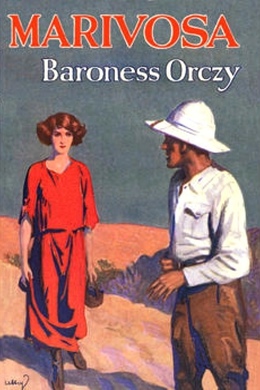
-
EPUB 361 KB
-
Kindle 416 KB
-
Support epubBooks by making a small $2.99 PayPal donation purchase.
This work is available for countries where copyright is Life+70 or less.
Description
Timothy O’Clerigh is cheated out of his inheritance by an unscrupulous woman. His efforts to ragain his lost fortune leads him to the South American continent and into the midsts a mysterious cult leader. There he meets and falls in love with the cultist’s daughter, for which he is taken prisoner…
356 pages with a reading time of ~5.50 hours (89167 words), and first published in 1930. This DRM-Free edition published by epubBooks, 2017.
Community Reviews
There are currently no other reviews for this book.
Excerpt
In the closing years of the last century there arose in the wooded highlands of Brazil a prophet whose name was Antonio Maciel. Of mixed Portuguese and Indian blood, this Maciel had been a store-keeper in his father’s business, had totted up accounts of black beans, tobacco and coffee, and had made entries for so many milreis in his ledger. Had it not been for matrimonial troubles Antonio would probably have ended his days peaceably and monotonously in the small provincial town of Quisceramobim, with no excitement to disturb the even tenor of his ways, save an occasional cock-fight on a Sunday, or a mock combat in the market-place.
Unfortunately, in the backwoods of Brazil, as everywhere else, love has its comedies and its tragedies; and even in the Sertao, surely the most desolate, the most isolated, the most abandoned corner of God’s earth, the same dramas of love, jealousy and hate are enacted as in the stately homes of England, or the boudoirs of Paris. It is only the mise-en-scène that is different. Antonio Maciel had the misfortune to marry a woman of no morality and an ungovernable temper, who indirectly became the cause of the most sanguinary religious conflict of modern times. Her intrigue with a police official of Bahia, a friend of her husband’s, became the turning-point in the career of the peaceable store-keeper. It roused the hot Portuguese blood in his veins. He came of a stock that had always held human life very cheap–especially that of an enemy–and coming upon the treacherous police official at a moment when his embittered soul was thirsting for revenge, he fell upon the betrayer of his honour with holy fury, and though he did not succeed in killing him, he inflicted grave bodily injury upon the traitor.
For this he was imprisoned, and from prison he escaped. Whither? No one knew. For ten years he disappeared and was duly forgotten. But ten years later he reappeared, no longer however as a simple-minded, hard-working storekeeper, but as a visionary and a prophet, preaching the Word of God, the Second Advent of the Lord, the Antichrist and the coming Day of Judgment.
Now the vaqueiros of the Sertao, cattle-raisers most of them, primitive, illiterate and wild, have a strong vein of mysticism and superstitious religious fervour in their veins. Catholics nominally, but in reality professing what amounts to the simplest form of theism, they know nothing and care less for the hierarchy of their Church. They are intensely devout, and religion plays a very important part in their lives; but as far as sacerdotalism is concerned, all they trouble about is the one curé of their district, who will absolve them of their sins, baptize them, marry and bury them; of Pope, hierarchy, and articles of faith they have only vaguely heard. Side by side, however, with their outward acceptance of the curé’s teachings, they keep up all the old beliefs of their mixed ancestry–the power of the snake-charmers, the Gri-gri men and devil-dancers from Africa, some Moorish practices, and Indian fetishes and totems, any superstition in fact that appeals to their imagination and to their mystic tendencies.
Suddenly then, in the midst of these primitive men, there appeared–coming God knows whence–this tall, emaciated, unkempt creature, clad in a loose robe, with prematurely grey hair and beard fluttering around his parchment-coloured face, loudly proclaiming the imminent destruction of the world by the sword of the Antichrist, and the coming of the Kingdom of God, to which only the elect would presently be called. The appeal was immediate. Men flocked around the prophet like flies around a honeypot. Casting aside their lassoes and their goads, they followed him in their hundreds and their thousands with their wives and their children; they looked upon him as a new John the Baptist, of whom they had only vaguely heard, but who, they believed, must have looked just like this prophet with the flashing eyes and the tall pastoral staff. They followed him; they obeyed him; they echoed his prophecies that the world was now coming to an end, and that therefore, deeds–whatever they were, good or evil–no longer mattered; only prayer mattered, incessant prayer and abstinence which would help to open the portals of the Kingdom of God to His elect.
Led by the erstwhile store-keeper, whom they now called Antonio Conselheiro–Antonio the Counsellor–they trekked as far as the shores of the Vasa Barris River; here they settled, and on a height overlooking the valley they started building an immense church, with their own homes and huts clustering on the surrounding slopes. They did no manner of harm to anyone, beyond consigning in their minds to everlasting damnation all those who did not hold the same beliefs as themselves. They spent their time in chanting hymns, listening to the prophet and building their church.
